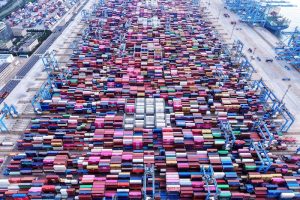Many shops and businesses remained closed in Beijing on Sunday, and an expert warned of many thousands of new Covid cases as worry about coping with infection grew in the world’s second-largest economy.
Anger over China’s strict zero-Covid regime has given way to concerns of a spike in infections after the country dropped most of its curbs on Wednesday.
But cities that were already battling with their most severe outbreaks, like Beijing, saw a sharp decrease in economic activity after rules such as regular testing were scrapped.
Also on AF: Plunging Trade Risks China’s Status as the ‘World’s Factory’
Anecdotal evidence suggests that many businesses have been forced to close as infected workers quarantine at home while many other people are deciding not to go out because of the higher risk of infection.
“In my company, the number of people who are Covid-negative is close to zero,” said one woman who works for a tourism and events firm in Beijing.
“We realise this can’t be avoided – everyone will just have to work from home,” she said.
High infection rate warning
Zhong Nanshan, a prominent Chinese epidemiologist, told state media that the Omicron strain of the virus prevalent in China was highly transmissible and one infected person could spread it to as many as 18 others.
“We can see that hundreds of thousands or tens of thousands of people are infected in several major cities,” Zhong said.
With regular Covid testing of Beijing residents scrapped and reserved only for groups such as health workers, official tallies for new cases have plunged.
Health authorities reported 1,661 new infections for Beijing on Saturday, down 42% from 3,974 on December 6, a day before national policies were dramatically relaxed.
But evidence suggests there are many more cases in the city of nearly 22 million people where everyone seems to know someone who has caught Covid.
Bumpy road to full economic recovery
Sunday is a normal business day for shops in Beijing and it is usually bustling, particularly in spots like the historic Shichahai neighbourhood packed with boutiques and cafes.
But few people were out and about on Sunday and malls in Chaoyang, Beijing’s most populous district, were practically deserted with many salons, restaurants and retailers shut.
Economists widely expect China’s road to economic health to be uneven as shocks such as labour crunches due to workers calling in sick delay a full-fledged recovery for some time yet.
Also on AF: China’s Trade Slumps to Lowest Levels in Over Two Years
“The transition out of zero-Covid will eventually allow consumer spending patterns to return to normal, but a higher risk of infection will keep in-person spending depressed for months after re-opening,” Mark Williams, chief Asia economist at Capital Economics, said in a note.
China’s economy may grow 1.6% in the first quarter of 2023 from a year earlier, and 4.9% in the second, according to Capital Economics.
While China has removed most of its domestic Covid curbs, its international borders are still largely closed to foreigners, including tourists.
Inbound travellers are subjected to five days of quarantine at centralised government facilities and three additional days of self-monitoring at home.
Epidemiologist Zhong said it would be some months before a return to normal.
“My opinion is in the first half of next year, after March,” he said.
- Reuters, with additional editing by Vishakha Saxena
























